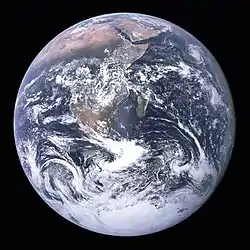地球
Chinese
earth; ground; field earth; ground; field; place; land; (subor. part. adverbial); ‑ly | ball; sphere | ||
|---|---|---|---|
| trad. (地球) | 地 | 球 | |
| simp. #(地球) | 地 | 球 | |
Etymology
Coined by Matteo Ricci (Huang, 2003).
Pronunciation
Proper noun
地球
- (astronomy) the Earth
- 地球自轉/地球自转 ― dìqiú zìzhuàn ― the Earth rotates; Earth's rotation
- 地球繞太陽公轉。/地球绕太阳公转。 ― Dìqiú rào tàiyáng gōngzhuàn. ― The earth revolves around the sun.
Coordinate terms
- (planets of the Solar System) 太陽系的行星/太阳系的行星; 水星 (Shuǐxīng), 金星 (Jīnxīng), 地球 (Dìqiú), 火星 (Huǒxīng), 木星 (Mùxīng), 土星 (Tǔxīng), 天王星 (Tiānwángxīng), 海王星 (Hǎiwángxīng)
Derived terms
|
|
Related terms
- 日球 (Rìqiú)
- 月球 (Yuèqiú)
Descendants
Sino-Xenic (地球):
- → Japanese: 地球 (Chikyū)
- → Korean: 지구(地球) (Jigu)
- → Vietnamese: Địa Cầu (地球)
Others:
- → Vietnamese: Trái Đất (calque)
Japanese
| Kanji in this term | |
|---|---|
| 地 | 球 |
| ち Grade: 2 | きゅう Grade: 3 |
| kan’on | |

地球 (chikyū): the globe, the Earth.
Etymology
From Chinese 地球, coined by Matteo Ricci.[1]
Pronunciation
- (Tokyo) ちきゅう [ch
ìkyúú] (Heiban – [0])[2][3] - IPA(key): [t͡ɕi̥kʲɨᵝː]
Proper noun
地球 • (Chikyū) ←ちきう (tikiu)?
- (astronomy, mythology) Earth; Terra
- 地球は24時間で1回自転します。
- Chikyū wa nijūyo-jikan de ikkai jiten shimasu.
- The Earth rotates once every 24 hours.
- 地球は太陽系の第3惑星です。
- Chikyū wa taiyōkei no dai-san wakusei desu.
- The Earth is the third planet of the Solar System.
- それでも地球は動く。
- sore de mo Chikyū wa ugoku.
- And yet the Earth moves.
- 1988 July 30 [Jul 25 1984], Fujiko F. Fujio, “世界名作童話第3巻 うらしま太郎 [World’s Renowned Fairy Tales Book 3: Urashima Tarō]”, in ポストの中の明日 [Post-Mid-Tomorrow] (藤子不二雄少年SF短編集; 2), volume 2 (fiction), 10th edition, Tokyo: Shogakukan, →ISBN, page 117:
- 地球は、サルのわく星になっていましたとさ。
- Chikyū wa, saru no wakusei ni natteimashita to sa.
- Meanwhile, Earth became the planet of the apes.
- 地球は、サルのわく星になっていましたとさ。
- 1999 October 17, “異次元からの侵略者 [Invader from a Different Dimension]”, in Booster 5, Konami:
- 銀河系の外から地球にやってきた宇宙人。
- Gingakei no soto kara Chikyū ni yattekita uchūjin.
- An alien that came to Earth from outside the Milky Way.
- 銀河系の外から地球にやってきた宇宙人。
- 地球は24時間で1回自転します。
Derived terms
Derived terms
- 地球温暖化 (chikyū ondanka): global warming
- 地球化学 (chikyū kagaku): geochemistry
- 地球昭 (chikyū shō): earthshine, illuminating the dark part of the Moon
- 地球外 (chikyūgai): extraterrestrial
- 地球外生物 (chikyūgai seibutsu): extraterrestrial life
- 地球外放射線 (chikyūgai hōshasen): extraterrestrial radiation
- 地球環境モニタリングシステム (Chikyū Kankyō Monitaringu Shisutemu): Global Environment Monitoring System (GEMS)
- 地球観測衛星 (chikyū kansoku eisei): Earth survey satellite
- 地球儀 (chikyūgi): terrestrial globe
- 地球型惑星 (chikyūgata wakusei): terrestrial planet, an Earth-like planet
- 地球磁気 (chikyū jiki): geomagnetism, terrestrial magnetism
- 地球周回衛星 (chikyū shūkai eisei): satellite orbiting the Earth, an Earth orbiter
- 地球周回軌道 (chikyū shūkai kidō): Earth orbit, an orbit around the Earth
- 地球楕円体 (chikyū daentai): Earth ellipsoid
- 地球潮汐 (chikyū chōseki): Earth tide, a terrestrial tide
- 地球物理学 (chikyū butsurigaku): geophysics
Related terms
- (planets of the Solar System) 太陽系の惑星 (Taiyōkei no wakusei); 水星 (Suisei, “Mercury”), 金星 (Kinsei, “Venus”), 地球 (Chikyū, “Earth”), 火星 (Kasei, “Mars”), 木星 (Mokusei, “Jupiter”), 土星 (Dosei, “Saturn”), 天王星 (Tennōsei, “Uranus”), 海王星 (Kaiōsei, “Neptune”) (Category: ja:Planets of the Solar System)
- ガイア (Gaia): Gaia or Gaea, the Greek goddess of the Earth
References
- 2003, Huang Heqing (黃河清), 利玛窦对汉语的贡献 (in Chinese)
- 1998, NHK日本語発音アクセント辞典 (NHK Japanese Pronunciation Accent Dictionary) (in Japanese), Tōkyō: NHK, →ISBN
- 2006, 大辞林 (Daijirin), Third Edition (in Japanese), Tōkyō: Sanseidō, →ISBN
Korean
| Hanja in this term | |
|---|---|
| 地 | 球 |
Proper noun
地球 • (Jigu) (hangeul 지구)
- Hanja form? of 지구 (“Earth”).
Vietnamese
| Hán tự in this term | |
|---|---|
| 地 | 球 |
Noun
地球
- chữ Hán form of địa cầu (“globe”).
Proper noun
地球
- chữ Hán form of Địa Cầu (“Earth”).